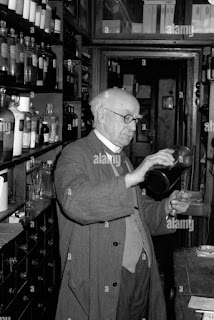New Month Old Post: Barry Cryer, who died last week, is remembered in this not-so-old post from 18th November, 2018
Leeds 1970. Mondays. Back to work. Accountancy 8.45 to 5.30. I’d better get used to it because it could be for the next forty or fifty years. One of the older guys could find his own handwriting in ledgers from the nineteen-thirties: like in Cat Stevens’
Matthew and Son.
But there was one good thing about Mondays:
Jokers Wild. The show had returned for a second series just after we moved into the first of our shared houses in March, 1970. I could be home for 6.15 when it went out on Yorkshire Television.
Jokers Wild (not to be confused with the American series of the same name) was a classic comedy show in which two teams of comedians competed by telling jokes on topics from cards drawn by Barry Cryer. Bonus points could be scored by interrupting a joke part-way through and completing the punchline. It was pretty much the first British example of many similar show formats: the
Mock the Week of fifty years ago.
Old copies of that wonderful provincial newspaper The Yorkshire Post, which at parochial odds with almost every other newspaper and magazine in the country listed Yorkshire Television ahead of the B.B.C., name the regular team captains as Ted Ray and Arthur Askey, with team members Les Dawson and Ray Martine. On the 6th April, 1970, the day my wild-joking accountant boss had wished me a happy new fiscal year (I ashamedly still use that joke every year without fail), they were joined by guests Clive Dunn and Stubby Kaye.
Ray Cameron (father of the present day comedian Michael McIntire), who invented the show, appeared in some episodes. Other regulars and guests read like a who’s-who of British comedy from the last days of music hall to the nineteen-seventies. Many of them smoked cigarettes overtly on-screen. Some are now so gone and forgotten they don’t even have Wikipedia pages.
 |
| Barry Cryer with the Jokers Wild Trophy (click to play) |
A
YouTube clip advertising a DVD of some of the shows has guests Joe Baker and Lance Percival, probably from the 13th or 20th April, 1970. In subsequent weeks the Yorkshire Post lists Jack Douglas (in character as the nervous-tic-suffering Alfred Ippititimus), Ray Fell, Ted Rogers, Graham Stark, Kenneth Connor and Arthur Worsley. Other online clips include Michael Aspel, Warren Mitchell, Tim Brooke-Taylor and Sid James.
Wikipedia and
IMDb also mention that over its five-year, nine-series run, others on the show included Eric Sykes, Jimmy Edwards, Roy Hudd, Alfred Marks, Professor Stanley Unwin, Norman Collier, Bob Monkhouse, Peter Goodwright, Jack Smethurst, Lennie Bennett, David Nixon, Roy Kinnear, John Cleese, Charlie Chester, Freddie Starr, Michael Bentine, Paul Andrews, Lonnie Donegan, Milo O’Shea, Kenneth Earle, Kenny Cantor, Clement Freud, Mike Hope, Albie Keen, Tony Brandon, John Junkin, Mike Burton, Don Maclean, Bobby Pattinson, Tony Stewart, Dick Bentley, Deryck Guyler, Laurence Harvey, Dickie Henderson, Bernard Bresslaw, Rolf Harris, John Pertwee and Fred Emney. As was the spirit of the time, few women appeared on the show, the only ones listed (including hostesses) being Isabella Rye, Diana Dors, Audrey Jeans, ‘the lovely’ Aimi MacDonald and June Whitfield. I can remember most on the list, but by no means all. Some were actually singers, actors or presenters rather than comedians.
They told a lot of sexist, racist, men-in-pub, wife and mother-in-law jokes. I remember Tim-Brooke Taylor being allowed almost to complete a joke about a town in Devon before Barry Cryer interrupted to remind him that the subject was supposed to be painting. “Oh,” he said sounding surprised. “I thought you said Paignton.” The wonderful and much-underrated Ray Martine, a Polari-speaking, camp Jewish comedian with a reputation for witty and effective put-downs, became more and more ill-at-ease and hesitant as the series progressed. He seemed unable to cope with constant teasing and interruptions, especially from Les Dawson. On one programme he looked so fed up he launched into a stream of jokes about Barry Cryer’s wife, which was taking things a bit too far. Barry Cryer took it with good grace and said that after the break they would be back with more jokes and a letter from his solicitor. And it was all done without a single swear word.
One might also reflect on prominent comedians of the time who were not on the show: no Morecambe and Wise; no Ronnies; no Tommy Cooper, Frankie Howerd, Kenneth Williams, Dick Emery, Harry Worth, Charlie Drake, Benny Hill or Jimmy Tarbuck; only a minority of Carry-Ons, Pythons, Goodies and Goons; and so many, many others. Perhaps they were too busy, or under exclusive contract to the B.B.C., or maybe it was just not their format.
It was at least a last chance to see some of the older generation: the wartime generation and earlier. Arthur Askey and Fred Emney were over 70 when they appeared, with Ted Ray not much younger. From all of these lists it is astonishing to realise just how many brilliant comedians there have been over the years.
It looks terribly dated now and was probably more scripted than improvised, but it still raises a laugh. The DVDs for Series 1 and 2 are tempting [I later bought the series 2 DVD]. A much better review than this of the first DVD appears
here.







































